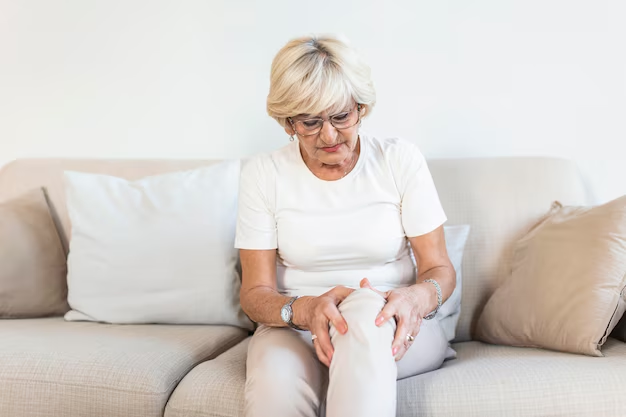Your Guide to Is Osteoporosis Painful
What You Get:
Free Guide
Free, helpful information about Osteoporosis FAQ and related Is Osteoporosis Painful topics.
Helpful Information
Get clear and easy-to-understand details about Is Osteoporosis Painful topics and resources.
Personalized Offers
Answer a few optional questions to receive offers or information related to Osteoporosis FAQ. The survey is optional and not required to access your free guide.
Understanding the Pain of Osteoporosis and Finding Support
When most people think of osteoporosis, they often associate it with fragile bones that are prone to fractures. But is osteoporosis painful by itself? The answer can be a bit complex. While osteoporosis doesn’t cause pain in its initial stages, the fractures that arise from the condition can lead to significant discomfort.
How Osteoporosis Leads to Pain
Silent Initial Stages: In the early phases, osteoporosis might not cause any symptoms or pain. Since it's called the "silent disease," one might not know they have it until a bone fracture occurs.
Fracture-Related Pain: These fractures — particularly in the spine and hip — can be extremely painful. Vertebral fractures, which are among the most common, can result in sharp back pain, a stooped posture, or even a significant reduction in height. Hip fractures can immobilize a person and require urgent medical intervention, leading to long-term pain and mobility issues.
Chronic Pain from Multiple Fractures: With repeated fractures, chronic pain can become a persistent issue. This can affect daily activities and lower the quality of life as individuals struggle to manage routines that were once simple.
Secondary Factors: Muscle spasms and other complications arising from fractured bones can add layers of discomfort, making pain management crucial in osteoporosis care.
Managing Osteoporosis Pain
If osteoporosis-induced fractures cause you pain, there are several avenues to pursue for relief:
- Pain Medication: Over-the-counter and prescription pain relievers can help manage discomfort.
- Physical Therapy: Targeted exercises can strengthen muscles, potentially reducing pain and improving movement.
- Lifestyle Changes: Nutrition rich in calcium and vitamin D alongside regular, low-impact exercise can enhance bone strength and overall health.
Exploring Financial Assistance and Support
Osteoporosis treatment and pain management can strain finances. Luckily, various programs exist to help patients find relief — not just from pain but also from financial stress.
Government Aid Programs
Medicare and Medicaid often cover osteoporosis treatments, including bone density tests and certain prescribed medications. It’s important to evaluate specific state benefits as they may vary.
Financial Assistance Resources
For those struggling with medical expenses, consider these options:
- Patient Assistance Programs (PAPs): Offered by pharmaceutical companies, PAPs provide medications at reduced costs or even for free to eligible patients.
- Non-Profit Organizations: Groups like the National Osteoporosis Foundation might offer resources or partner with programs providing financial aid.
Credit and Debt Relief Options
Managing healthcare costs sometimes demands more immediate financial solutions:
- Medical Credit Cards: Used specifically for healthcare, these cards often have promotional no-interest periods.
- Debt Counseling Services: Organizations can assist in negotiating medical bills or setting up manageable repayment plans.
Educational Opportunities
Exploring osteoporosis more deeply can empower patients and their families:
- Online Courses: Websites offering free courses on osteoporosis management can provide valuable strategies for dealing with both the condition and its associated financial burdens.
Taking advantage of these resources can ease the tension of both physical and financial pain, allowing individuals to focus on recovery and future wellness.
🛠️ Financial & Supportive Resources:
🇺🇸 Medicare/Medicaid: Coverage for osteoporosis-related treatments.
🏥 Patient Assistance Programs (PAPs): Reduced-cost medications.
📚 Educational Courses: Informative online resources about managing osteoporosis.
💳 Medical Credit Cards: Options with promotional interest rates for health expenses.
🗂️ Non-Profit Support: Partner organizations providing help and information.
📊 Debt Counseling Services: Professional assistance with medical expenses management.
What You Get:
Free Osteoporosis FAQ Guide
Free, helpful information about Is Osteoporosis Painful and related resources.

Helpful Information
Get clear, easy-to-understand details about Is Osteoporosis Painful topics.

Optional Personalized Offers
Answer a few optional questions to see offers or information related to Osteoporosis FAQ. Participation is not required to get your free guide.


Discover More
- a Nurse Is Caring For a Client Who Has Osteoporosis.
- a Percutaneous Is Performed To Treat Osteoporosis Related Compression Fractures
- Can Alcohol Cause Osteoporosis
- Can I Do Pilates If I Have Osteoporosis
- Can I Reverse Osteoporosis
- Can Men Get Osteoporosis
- Can Osteoporosis Affect Teeth
- Can Osteoporosis Be Cured
- Can Osteoporosis Be Painful
- Can Osteoporosis Be Reversed
